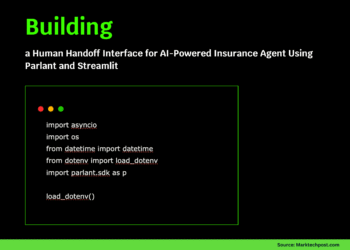MLflow is a powerful open-source platform for managing the machine learning lifecycle. While it’s traditionally used for tracking model experiments, logging parameters, and managing deployments, MLflow has recently introduced support for evaluating Large Language Models (LLMs).
In this tutorial, we explore how to use MLflow to evaluate the performance of an LLM—in our case, Google’s Gemini model—on a set of fact-based prompts. We’ll generate responses to fact-based prompts using Gemini and assess their quality using a variety of metrics supported directly by MLflow.
Setting up the dependencies
For this tutorial, we’ll be using both the OpenAI and Gemini APIs. MLflow’s built-in generative AI evaluation metrics currently rely on OpenAI models (e.g., GPT-4) to act as judges for metrics like answer similarity or faithfulness, so an OpenAI API key is required. You can obtain:
Installing the libraries
pip install mlflow openai pandas google-genaiSetting the OpenAI and Google API Keys as environment variable
import os
from getpass import getpass
os.environ["OPENAI_API_KEY"] = getpass('Enter OpenAI API Key:')
os.environ["GOOGLE_API_KEY"] = getpass('Enter Google API Key:')Preparing Evaluation Data and Fetching Outputs from Gemini
import mlflow
import openai
import os
import pandas as pd
from google import genaiCreating the evaluation data
In this step, we define a small evaluation dataset containing factual prompts along with their correct ground truth answers. These prompts span topics such as science, health, web development, and programming. This structured format allows us to objectively compare the Gemini-generated responses against known correct answers using various evaluation metrics in MLflow.
eval_data = pd.DataFrame(
{
"inputs": [
"Who developed the theory of general relativity?",
"What are the primary functions of the liver in the human body?",
"Explain what HTTP status code 404 means.",
"What is the boiling point of water at sea level in Celsius?",
"Name the largest planet in our solar system.",
"What programming language is primarily used for developing iOS apps?",
],
"ground_truth": [
"Albert Einstein developed the theory of general relativity.",
"The liver helps in detoxification, protein synthesis, and production of biochemicals necessary for digestion.",
"HTTP 404 means 'Not Found' -- the server can't find the requested resource.",
"The boiling point of water at sea level is 100 degrees Celsius.",
"Jupiter is the largest planet in our solar system.",
"Swift is the primary programming language used for iOS app development."
]
}
)
eval_dataGetting Gemini Responses
This code block defines a helper function gemini_completion() that sends a prompt to the Gemini 1.5 Flash model using the Google Generative AI SDK and returns the generated response as plain text. We then apply this function to each prompt in our evaluation dataset to generate the model’s predictions, storing them in a new “predictions” column. These predictions will later be evaluated against the ground truth answers
client = genai.Client()
def gemini_completion(prompt: str) -> str:
response = client.models.generate_content(
model="gemini-1.5-flash",
contents=prompt
)
return response.text.strip()
eval_data["predictions"] = eval_data["inputs"].apply(gemini_completion)
eval_dataEvaluating Gemini Outputs with MLflow
In this step, we initiate an MLflow run to evaluate the responses generated by the Gemini model against a set of factual ground-truth answers. We use the mlflow.evaluate() method with four lightweight metrics: answer_similarity (measuring semantic similarity between the model’s output and the ground truth), exact_match (checking for word-for-word matches), latency (tracking response generation time), and token_count (logging the number of output tokens).
It’s important to note that the answer_similarity metric internally uses OpenAI’s GPT model to judge the semantic closeness between answers, which is why access to the OpenAI API is required. This setup provides an efficient way to assess LLM outputs without relying on custom evaluation logic. The final evaluation results are printed and also saved to a CSV file for later inspection or visualization.
mlflow.set_tracking_uri("mlruns")
mlflow.set_experiment("Gemini Simple Metrics Eval")
with mlflow.start_run():
results = mlflow.evaluate(
model_type="question-answering",
data=eval_data,
predictions="predictions",
targets="ground_truth",
extra_metrics=[
mlflow.metrics.genai.answer_similarity(),
mlflow.metrics.exact_match(),
mlflow.metrics.latency(),
mlflow.metrics.token_count()
]
)
print("Aggregated Metrics:")
print(results.metrics)
# Save detailed table
results.tables["eval_results_table"].to_csv("gemini_eval_results.csv", index=False)To view the detailed results of our evaluation, we load the saved CSV file into a DataFrame and adjust the display settings to ensure full visibility of each response. This allows us to inspect individual prompts, Gemini-generated predictions, ground truth answers, and the associated metric scores without truncation, which is especially helpful in notebook environments like Colab or Jupyter.
results = pd.read_csv('gemini_eval_results.csv')
pd.set_option('display.max_colwidth', None)
resultsCheck out the Codes here. All credit for this research goes to the researchers of this project. Also, feel free to follow us on Twitter and don’t forget to join our 100k+ ML SubReddit and Subscribe to our Newsletter.




















